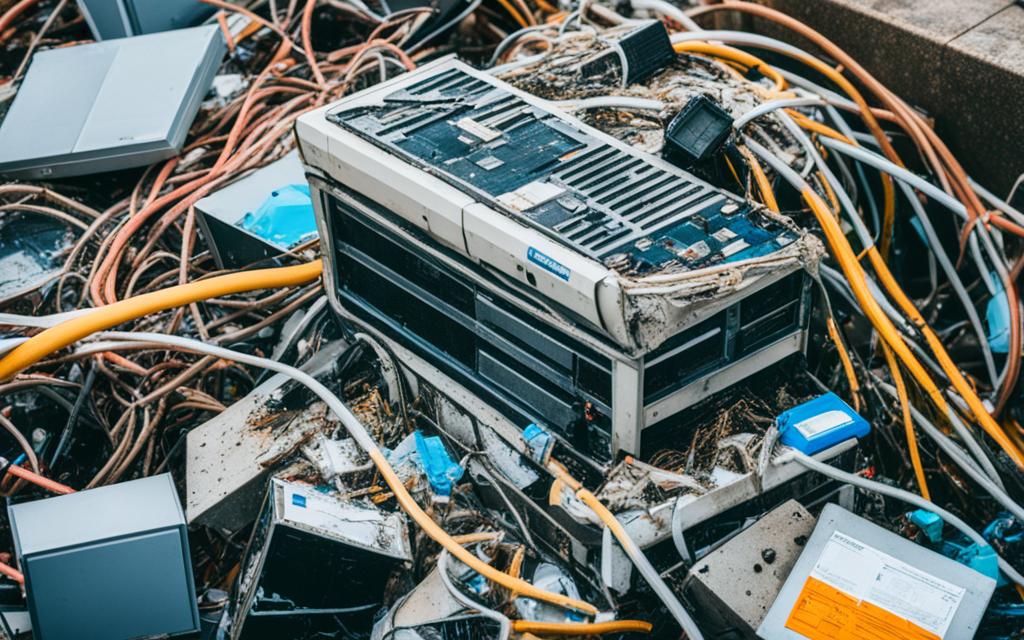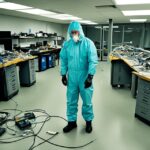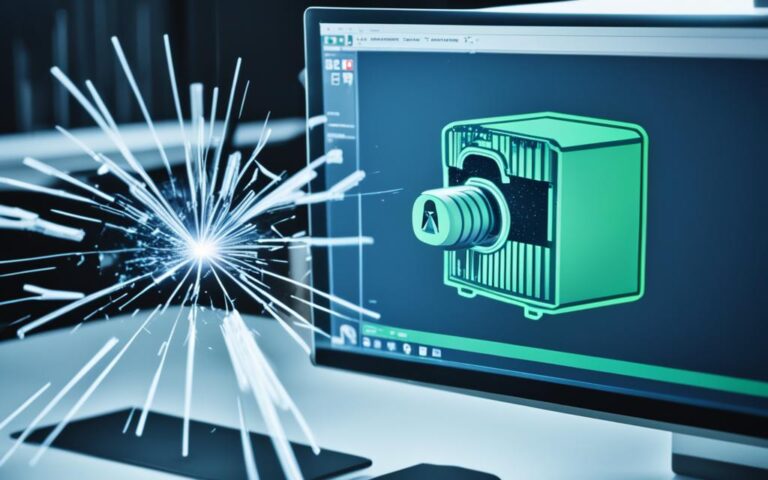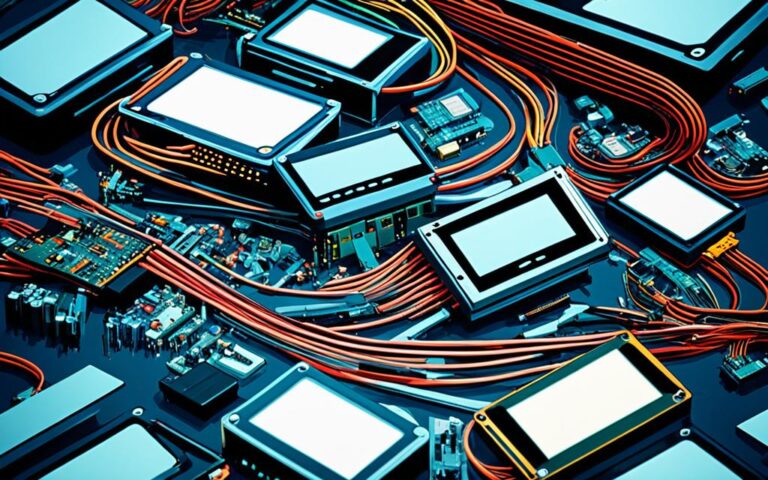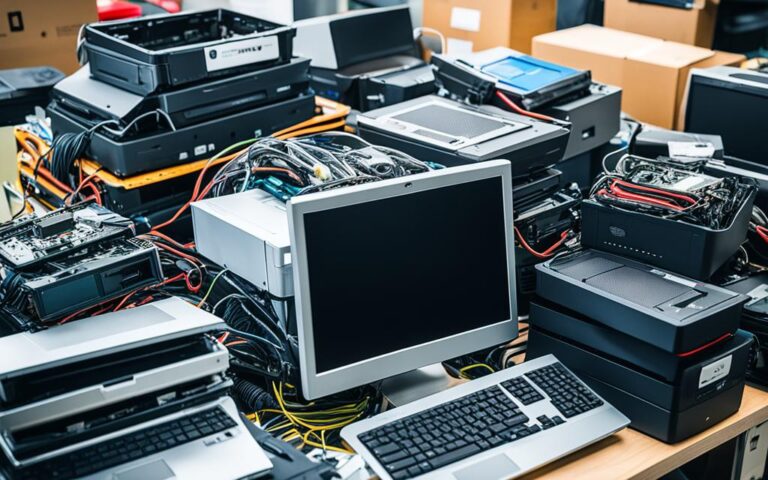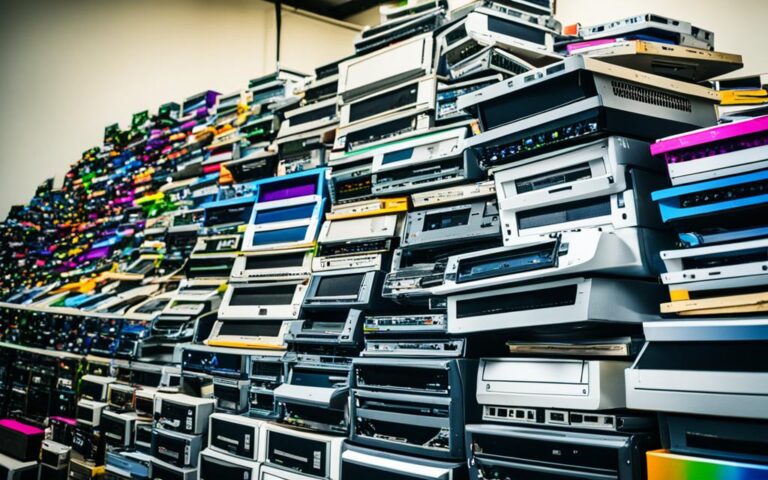The Business Case for Sustainable PC Disposal
Dell, one of the world’s largest computer manufacturers, has embraced sustainable business practices in PC disposal. By incorporating recycled plastic into its products and prioritizing ease of repair and recyclability, Dell is actively contributing to responsible e-waste disposal. The company’s global takeback program has successfully recovered 1.76 billion pounds of electronics since 2007.
With a closed-loop recycled plastic supply chain, Dell has utilized plastics recovered from recycled computers to create nearly 5,000 tonnes of new parts for over 90 products. This sustainable approach not only benefits the environment but also offers economic advantages by reducing reliance on fossil fuels. By adopting such practices, Dell sets an example for other businesses to follow in their pursuit of sustainable business strategies.
The Importance of Responsible E-Waste Disposal
E-waste, responsible e-waste disposal, plays a vital role in building a sustainable future. As the fastest-growing waste stream globally, e-waste poses significant environmental and economic challenges. The rapid pace of technological innovation, coupled with short product lifespans, contributes to the surge in discarded electronics. Dell, a leading advocate for sustainable practices, recognizes the importance of responsible e-waste disposal in mitigating these challenges.
Dell’s approach aligns with the circular economy model, an innovative concept that moves away from the traditional linear “take, make, dispose” approach. Instead, it aims to create a closed-loop ecosystem, where resources are utilized efficiently and consistently, reducing waste and minimizing environmental impact.
By actively taking back and refurbishing used electronics, Dell maximizes the lifecycle of these products. Through their recycling program, Dell ensures that products beyond repair are properly recycled, allowing valuable materials to re-enter the supply chain, minimizing strain on landfills. This closed-loop ecosystem enables Dell to extract the maximum value from e-waste materials, contributing to a more sustainable future.
“The circular economy model offers a more efficient closed-loop ecosystem, where waste is minimized and resources are utilized efficiently.”
Recycled plastics are a key component of Dell’s closed-loop ecosystem. By incorporating recycled plastics into the design and manufacturing of new products, Dell demonstrates the practical implementation of sustainable practices. This integration not only reduces the demand for virgin plastics but also showcases the economic viability of responsible e-waste disposal.
| Benefits of Responsible E-Waste Disposal | Challenges in Responsible E-Waste Disposal |
|---|---|
|
|
Responsible e-waste disposal is a crucial step towards achieving a more sustainable future. It not only helps reduce the environmental impact of discarded electronics but also creates opportunities for resource optimization and economic growth. Dell’s commitment to the circular economy model and closed-loop ecosystem sets an example for businesses worldwide, emphasizing the importance of responsible e-waste disposal in building a greener and more prosperous future.
Dell’s Sustainable Business Strategy
Dell’s sustainable business strategy focuses on creating products that prioritize repairability and recyclability throughout their lifecycle. By emphasizing these aspects in product design, Dell ensures that components can be easily reused or recycled, minimizing waste and promoting a circular economy.
One of the key ways Dell incorporates sustainability into its products is by integrating sustainable materials such as recycled plastic and reclaimed carbon fiber. These materials not only reduce the environmental impact of production but also contribute to the overall durability and performance of the products.
“At Dell, we believe that sustainability is an essential part of our business strategy. We aim to create products that not only meet the needs of our customers but also align with our vision of a more sustainable future. By designing for repairability and recyclability, we can extend the lifespan of our products and reduce the amount of electronic waste generated.”
— Michael Dell, CEO of Dell Technologies
In addition to product design, Dell has implemented a comprehensive recycling program to tackle electronic waste. Through the Global Takeback program, Dell offers free recycling services to customers for old electronics that cannot be repaired or reused. This initiative has already recovered billions of pounds of electronics, diverting them from landfills and contributing to a more sustainable future.
- Key highlights of Dell’s sustainable business strategy:
- Product design that prioritizes repairability and recyclability.
- Integration of sustainable materials such as recycled plastic and reclaimed carbon fiber.
- Implementation of the Global Takeback program for free recycling services.
Dell’s commitment to sustainability extends beyond its own operations. The company actively explores partnerships and collaboration opportunities with suppliers, customers, and other stakeholders to drive positive change in the industry. By promoting sustainable practices and encouraging the adoption of circular economy principles, Dell is leading the way towards a more sustainable future.
Challenges in Transitioning to a Closed-Loop Recycling System
While there are numerous benefits associated with implementing a closed-loop recycling system, there are significant challenges when it comes to sourcing an adequate supply of high-quality post-consumer recycled plastics. Meeting the technical, economic, and aesthetic requirements of ICT product manufacturers, such as Dell, presents certain difficulties. In particular, plastic recycling remains a complex process that contributes significantly to landfills.
However, Dell is fully committed to overcoming these obstacles and expanding its recycling program. The company is actively exploring new collection capacity in developing countries, allowing them to tap into a broader range of resources. By building a stable closed-loop supply chain for recycled plastics, Dell aims to effectively utilize the plastics recovered through take-back programs for used electronics.
Transitioning to a closed-loop recycling system is crucial not only for Dell but also for the entire industry. By addressing these challenges head-on, we can work towards achieving a more sustainable and efficient product ecosystem.
Conclusion
Dell’s sustainable business practices in PC disposal exemplify the transformative potential of companies in positively impacting the environment while reaping economic benefits. Through the incorporation of recycled plastic in their products and a strong emphasis on product design for repair and recyclability, Dell showcases its commitment to responsible e-waste disposal and sustainability. Additionally, their comprehensive takeback and recycling program further reinforces their dedication to minimizing the impact of electronic waste.
By scaling up these initiatives and exploring new collection capacity in developing countries, Dell can significantly enhance its impact on sustainable business practices. The company’s innovative approaches serve as an inspiration for other businesses to adopt similar sustainable practices throughout their operations. Dell’s success in implementing a closed-loop system and utilizing recycled plastics sets an example for the industry, paving the way for a more environmentally conscious approach to product manufacturing and disposal.
In conclusion, Dell’s efforts not only contribute to a healthier planet but also demonstrate the immense potential for sustainable business practices to drive economic growth. By prioritizing responsible e-waste disposal and incorporating sustainable materials, Dell is leading the way toward a more circular economy, where resources are kept in use for as long as possible. As more companies follow in Dell’s footsteps, the impact on the environment and society as a whole will be substantial, creating a brighter and more sustainable future.
FAQ
What is Dell’s approach to sustainable PC disposal?
Dell takes a sustainable approach to PC disposal by incorporating recycled plastic into its products, emphasizing ease of repair and recyclability, and implementing a comprehensive takeback and recycling program.
How does Dell contribute to responsible e-waste disposal?
Dell contributes to responsible e-waste disposal by incorporating recycled plastic into its products, maximizing the value of e-waste materials through refurbishing and recycling, and offering free recycling services through its Global Takeback program.
What is the circular economy, and how does it relate to responsible e-waste disposal?
The circular economy is a model that aims to move away from the linear “take, make, dispose” approach and create a closed-loop ecosystem. It is related to responsible e-waste disposal because it emphasizes the refurbishment, recycling, and reuse of electronic products to maximize their value and reduce strain on landfills.
How does Dell incorporate sustainable practices into its product design?
Dell incorporates sustainable practices into its product design by emphasizing ease of repair and recyclability, using sustainable materials such as recycled plastic and reclaimed carbon fiber, and ensuring that components can be easily reused or recycled.
What is Dell’s Global Takeback program?
Dell’s Global Takeback program is a comprehensive takeback and recycling program that simplifies the disposal of old electronics for customers. It offers free recycling services for products that cannot be repaired or reused, contributing to responsible e-waste disposal.
What are the challenges in transitioning to a closed-loop recycling system?
The challenges in transitioning to a closed-loop recycling system include sourcing sufficient high-quality post-consumer recycled plastics that meet technical, economic, and aesthetic requirements, especially for ICT product manufacturers like Dell. Plastic recycling, in particular, poses significant challenges and contributes to landfills.
How is Dell addressing the challenges in transitioning to a closed-loop recycling system?
Dell is committed to scaling its recycling program and exploring new collection capacity in developing countries to address the challenges in transitioning to a closed-loop recycling system. Building a stable closed-loop supply chain for recycled plastics from used electronics collected through take-back programs is crucial in creating a more sustainable and efficient product ecosystem.
What impact does Dell’s sustainable business practices have?
Dell’s sustainable business practices in PC disposal not only contribute to responsible e-waste disposal but also offer economic benefits. By incorporating recycled plastic, emphasizing product design for repair and recyclability, and implementing a comprehensive takeback and recycling program, Dell sets an example for other businesses to adopt sustainable practices in their operations.

